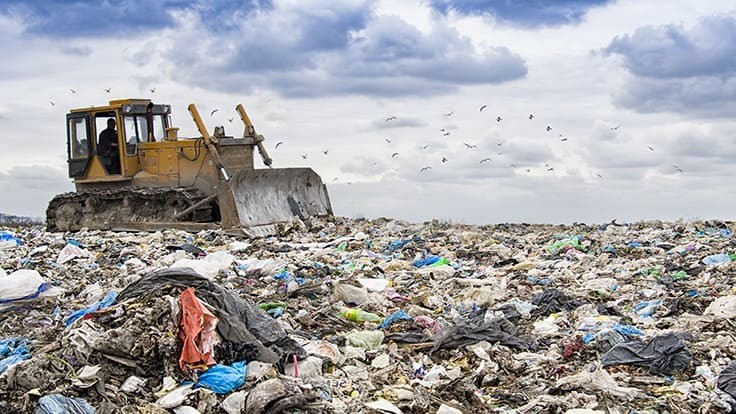✓ Fast delivery and pickup
✓ Customer friendly staff
✓ Serving the Daytona Beach area
✓ Call (386) 703-4219 today!
✓ Satisfaction guaranteed
Landfills are designated dump sites where trash is buried. While any type of trash can be dumped in a landfill, only certain types of waste can be buried without first being processed. Which waste products are acceptable for disposal at a given landfill depends on the specific landfill design. There are two basic types of landfills: sanitary landfills, which are used for regular trash, and hazardous waste dumps, which are utilised for dangerous materials. To minimise leaching of toxins from the waste being disposed of into nearby streams or ground water, a sanitary landfill includes additional containment methods, such as lining the landfill with clay or plastic composite. High-volume industrial landfills are also subject to environmental regulations that mandate the safe disposal of trash in a manner that prevents contamination of nearby groundwater.
Forms of Landfills
There are currently three categories of landfills: those dedicated to hazardous waste, those to industrial trash, and those dedicated to municipal solid garbage. All of them use different methods to reduce their influence on the environment, such as limiting the types of trash they’ll take in and having strict rules on recycling. In addition, a new green trash system is being developed to provide a managed landfill alternative for organic waste.
Municipal Solid Waste Landfills
Your trash will most likely be hauled to a municipal solid waste landfill if you use a trash container (MSW). When most people think of a landfill, they picture one of these locations. Despite their prevalence, they are not always available to the general public. Most of the trash that ends up in MSW landfills comes from houses, such as used tissues and cardboard boxes from a basement cleanout, therefore they have some of the strictest restrictions about safety and keeping a watch on things. The landfill’s lining, operations, groundwater monitoring, and closure are often governed by these regulations.
Disposal Sites for Factory Garbage
In order to get rid of trash like this from factories, people use something called a landfill. Landfills of this type are frequently referred to as “C&D” landfills because they are commonly used to dispose of construction debris, but they are technically able to accept any solid industrial waste.
Items commonly found in industrial dumps include: concrete, lumber, asphalt, gypsum, metal, bricks, and building supplies (doors, countertops, cabinets, etc.) Contrarily, C&D landfills serve dual purposes as both MRFs and storage areas for building debris. Workers at the dump stack the objects brought in and sort them to determine which ones can be reused and which ones should be discarded.
Landfills For Dangerous Waste
It should go without saying that the most meticulously managed and constructed landfills are those that house hazardous garbage. They’re made to keep poisonous waste from escaping into nature.
Sites for dumping hazardous waste must adhere to certain design criteria, such as the use of two layers of liner, two layers of leachate collection and removal systems, leak detection systems, controls for run-on, runoff, and wind dispersion, and ways to ensure the quality of the construction.
In addition to these structural elements, hazardous waste dumps are subject to frequent, sometimes annual, inspections to verify compliance with regulations and adherence to best practices.
Green Waste Landfills
Many municipalities are beginning to provide a site for organic garbage to break down on its own, despite the fact that the EPA has not granted legal authority for such dumps. Composting facilities are growing in popularity as an alternative to traditional landfills and transfer stations, which typically do not accept food scraps, yard trash, and other organic materials. Some people, according to Morris, “would accept yard garbage for greater fees.” “It will work on some sites but not others.” In this area, everything is handled by your local government.

Florida Specific Landfills
NORTHWEST 58TH STREET LANDFILL
The 660-acre Northwest 58th Street Landfill Superfund site is located in Hialeah, Florida. From 1952 to 1982, Miami-Dade County operated a municipal landfill at the site. The landfill accepted municipal and industrial wastes. Improper storage and burning of waste on site resulted in the contamination of groundwater.
Springhill Regional Landfill
Springhill Landfill offers the following non-hazardous waste disposal services: Asbestos-Friable,Asbestos-Non-Friable,Auto Shredder Fluff,Biosolids,Construction & Demolition Debris,Drum Management-Liquids,Drum Management-Solids,Industrial & Special Waste,Liquifix (Solidification Services),Municipal Solid Waste,Tires,Yard Waste and ,CERCLA Waste
The Harm Caused By Landfills To Nature
The release of methane gas from landfills is the most serious environmental threat. Methane gas is produced by the decomposition of organic waste in landfills. Methane is a significant contributor to global warming. It’s a leading contributor to global warming because it soaks up solar radiation 84 times more efficiently than carbon dioxide does.
Carbon dioxide, water vapour, and trace amounts of oxygen, nitrogen, and other organic molecules are also released by landfills, in addition to methane. These gases have the potential to alter the climate and pollute the air if they are not contained.
Landfill construction typically results in the loss of valuable wildlife habitat. Landfills often span 600 acres. These plastic or clay liners commonly leak, despite the fact that they are required by law for all landfills. This increases the risk of leachate, a liquid produced by landfills, entering adjacent water sources and wreaking more havoc on local ecosystems.
Conclusion:
Landfills are a vital part of the waste management system, and they do provide some benefits. Toxic waste in a landfill, for example, may harm the ecosystem if it were not monitored. Furthermore, landfill gas (both methane and carbon dioxide) can be captured and converted into electricity.
✓ Fast delivery and pickup
✓ Customer friendly staff
✓ Serving the Daytona Beach area
✓ Call (386) 703-4219 today!
✓ Satisfaction guaranteed
